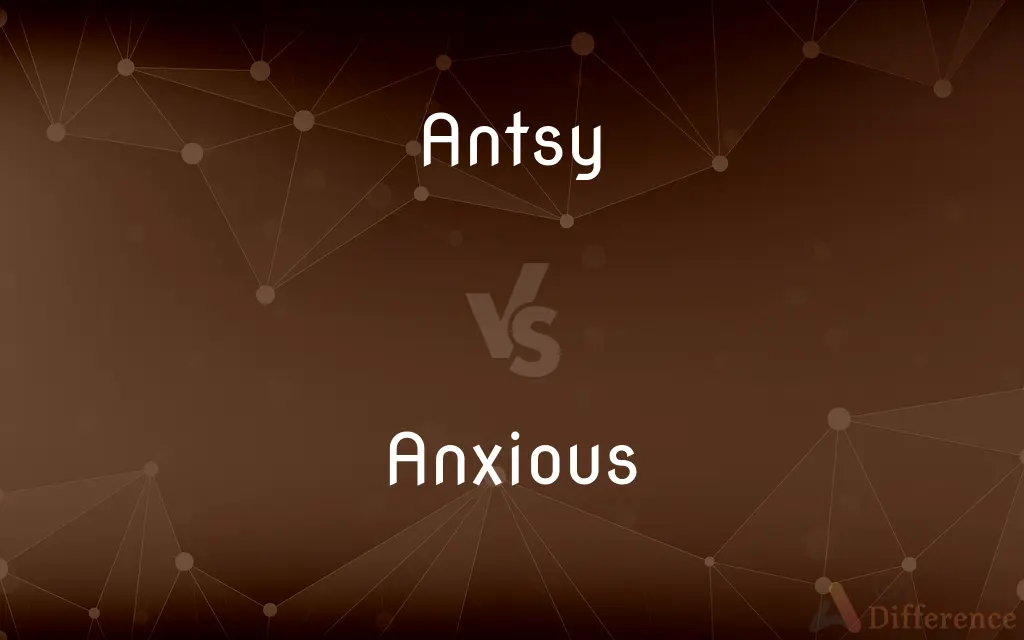Antsy vs. Anxious — What's the Difference?
By Urooj Arif & Maham Liaqat — Updated on April 23, 2024
Antsy refers to restlessness or impatience, often due to boredom or desire for change, while anxious describes a feeling of worry, unease, or nervousness, typically about an imminent event or something with an uncertain outcome.

Difference Between Antsy and Anxious
Table of Contents
ADVERTISEMENT
Key Differences
Antsy often captures a lighter, more transient feeling of restlessness, commonly stemming from boredom or the need to move or do something. On the other hand, anxious involves a deeper, often more debilitating sense of worry or fear about a specific situation or future uncertainties.
Being antsy might lead someone to fidget, pace, or seek out different activities as a form of distraction or to release pent-up energy. Whereas feeling anxious can result in more intense physical symptoms like sweating, trembling, or a racing heart, reflecting deeper emotional distress.
The term antsy is typically used in less serious contexts and may simply indicate a desire for a change in scenery or activity. In contrast, anxious is used in contexts that involve greater stakes, like worrying about an upcoming exam or a job interview.
Antsy can be resolved relatively quickly once the person changes their current situation or engages in a new activity. Conversely, anxiety often requires more comprehensive strategies to manage, such as therapy or medication, especially if it is chronic or severe.
Someone who is antsy might just seem energetic or eager, which is generally more socially acceptable. On the other hand, anxiety can sometimes be perceived as a psychological issue that might invite stigma or misunderstanding, making it a more sensitive condition.
ADVERTISEMENT
Comparison Chart
Origin of Feeling
Boredom, desire for change
Worry about future or uncertain events
Intensity
Mild, often fleeting
Can be intense and prolonged
Physical Manifestation
Fidgeting, pacing
Sweating, trembling, heart palpitations
Resolution
Change in activity or scenery
May require psychological intervention
Social Perception
Often seen as restlessness or eagerness
May be viewed as a psychological concern
Compare with Definitions
Antsy
Characterized by a restless desire for activity.
Feeling antsy, she went for a jog to burn off some energy.
Anxious
Involving or resulting from anxiety.
His anxious demeanor was noticeable when discussing finances.
Antsy
Feeling restless or unable to stay still.
He felt antsy during the long meeting and needed to take a walk.
Anxious
Feeling worried or nervous about a potential outcome.
She was anxious about her medical test results.
Antsy
Needing to change or do something different.
After finishing her project, she felt antsy to start something new.
Anxious
Experiencing unease about future uncertainties.
He felt anxious as he awaited the start of the interview.
Antsy
Exhibiting impatience or a desire to move.
The kids got antsy after an hour of driving and started to squabble.
Anxious
Pertaining to a state of apprehension or fear.
Before the performance, she felt an anxious excitement.
Antsy
Displaying a fidgety or uneasy behavior.
Waiting for the results made him antsy, and he couldn’t sit still.
Anxious
Showing signs of anxiety or distress.
Anxious thoughts kept her awake at night.
Antsy
Restless or impatient; fidgety
The long wait made the children antsy.
Anxious
Uneasy and apprehensive about an uncertain event or matter; worried.
Antsy
Nervous; apprehensive
"Camps got shot up all the time, but if there wasn't a shoot-up, they'd get antsy" (Harper's).
Anxious
Attended with, showing, or causing anxiety
Spent an anxious night waiting for the test results.
Antsy
(slang) restless, apprehensive and fidgety
Anxious
Usage Problem Eagerly or earnestly desirous.
Anxious
Nervous and worried.
Anxious
Having a feeling of anxiety or disquietude; extremely concerned, especially about something that will happen in the future or that is unknown.
She was anxious to hear how her test results were.
I could tell she was anxious as she was biting her nails.
Anxious
(of things) Accompanied with, or causing, anxiety; worrying.
Anxious labor
There was an anxious wait before the results were revealed.
Anxious
Earnestly desirous.
He is anxious to please, so you can count on him.
All the voters were anxious to hear the election result.
Anxious
Full of anxiety or disquietude; greatly concerned or solicitous, esp. respecting something future or unknown; being in painful suspense; - applied to persons; as, anxious for the issue of a battle.
Anxious
Accompanied with, or causing, anxiety; worrying; - applied to things; as, anxious labor.
The sweet of life, from whichGod hath bid dwell far off all anxious cares.
Anxious
Earnestly desirous; as, anxious to please.
He sneers alike at those who are anxious to preserve and at those who are eager for reform.
Anxious
Mentally upset over possible misfortune or danger etc; worried;
Anxious parents
Anxious about her job
Not used to a city and anxious about small things
Felt apprehensive about the consequences
Anxious
Eagerly desirous;
Anxious to see the new show at the museum
Dying to hear who won
Anxious
Causing or fraught with or showing anxiety;
Spent an anxious night waiting for the test results
Cast anxious glances behind her
Those nervous moments before takeoff
An unquiet mind
Common Curiosities
Can feeling antsy turn into anxiety?
Yes, if restlessness or impatience due to a situation becomes worry or fear about outcomes, it can escalate into anxiety.
What is the primary difference between feeling antsy and anxious?
Feeling antsy is usually about restlessness or impatience, often light-hearted, while anxious involves deeper worry or fear about something specific.
What are some common triggers for anxiety?
Common triggers include stress from work, personal relationships, financial concerns, and health issues.
What does it mean when anxiety is described as chronic?
Chronic anxiety is persistent and long-lasting, often affecting multiple aspects of a person’s life.
How can one alleviate feeling antsy?
Changing activities, taking a break, or engaging in physical exercise can help alleviate feelings of being antsy.
Are there specific activities that make people feel antsy?
Long periods of inactivity, monotonous tasks, or waiting in one place can make someone feel antsy.
How is anxiety treated medically?
Anxiety can be treated through counseling, medication, lifestyle changes, and relaxation techniques.
Can children feel anxious?
Yes, children can experience anxiety, often about school, their peers, or changes in their routine.
Is it common to feel both antsy and anxious?
Yes, people can feel both if they are restless about a situation and also worried about its outcomes.
What are physical symptoms of anxiety?
Physical symptoms can include sweating, trembling, dizziness, and a rapid heartbeat.
Share Your Discovery

Previous Comparison
Spool vs. Bobbin
Next Comparison
Pastry vs. CookieAuthor Spotlight
Written by
Urooj ArifUrooj is a skilled content writer at Ask Difference, known for her exceptional ability to simplify complex topics into engaging and informative content. With a passion for research and a flair for clear, concise writing, she consistently delivers articles that resonate with our diverse audience.
Co-written by
Maham Liaqat















































